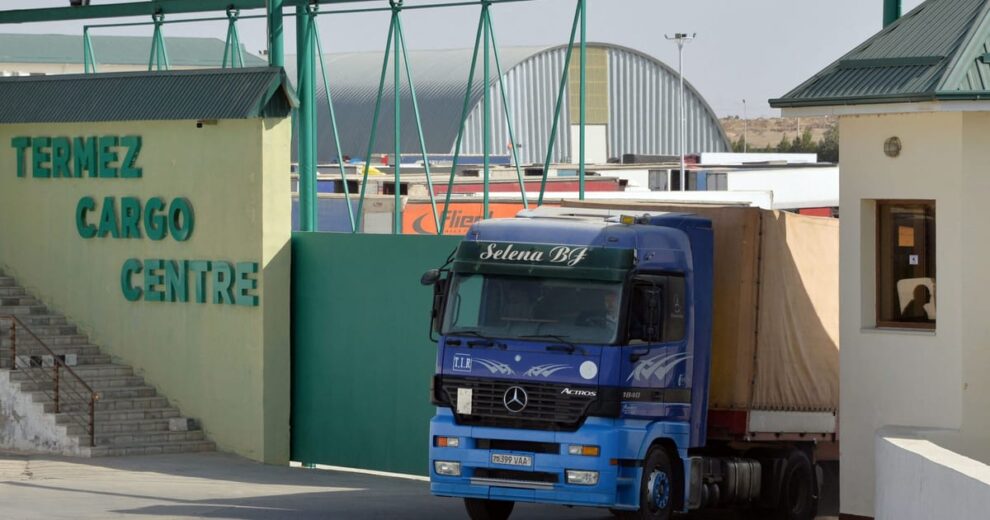Several EU countries fear Brussels risk opening a Pandora’s box with a new measure that could eventually be used against China and Turkey.
Central Asian countries such as Uzbekistan and Kazakhstan are the most likely first targets of a radical new EU proposal to stop Russia busting sanctions by importing the high-tech components required to wage war through its neighbors.
The EU is moving toward its 11th package of sanctions against Russia to try to sap President Vladimir Putin’s military machine and, for the first time, its proposal will include counter-measures against countries helping Moscow dodge Brussels’ trade embargo. China and Turkey are the nations most often credited with throwing Russia an economic lifeline — but EU diplomats cautioned that Ankara and Beijing were not their immediate targets, and that measures against such significant geostrategic trade partners risked backfiring.
Instead, three EU diplomats said the hope was that the EU’s impending proposals on sanctions circumvention would encourage Central Asian states to fall into line. The full 11th sanctions package could be unveiled as early as Tuesday, when European Commission President Ursula von der Leyen visits Kyiv to mark Europe Day.
EU sanctions envoy David O’Sullivan has traveled to Turkey, Uzbekistan and Kazakhstan in recent weeks in a bid to gauge the scale of sanctions circumvention.
Under the proposal for the 11th package, seen by POLITICO, the Commission wants to target “persons and entities circumventing the Union’s restrictive measures by activities which have the aim or result of frustrating the prohibitions in those measures. This concerns, for example, companies established in third countries, which obtain goods subject to restrictions from companies established in the Union and which are then supplied to Russia, directly or through intermediaries.”
Significantly, no specific countries or products are named in the two annexes to the proposal — instead it will be up to EU countries to make that decision. In addition to the new proposal, the 11th sanctions package also currentlyincludes listings of 72 individuals and 31 entities.
The central plank of this new EU measure would be to restrict European companies from selling sensitive goods to one of Russia’s neighbors if there were circumvention. The sanctions would first list sensitive products in terms of circumvention, then the countries where they are being shipped.
EU ambassadors will offer their first impressions on the proposal on Wednesday. EU diplomats don’t expect a deal on the new package until next week, or even the week after. The Kazakh and Uzbek embassies to the EU did not have an immediate response.
Not so fast
But that doesn’t mean the anti-circumvention measures will win a quick sign-off.
Several EU countries fear Brussels risks opening a Pandora’s box with the proposal. By establishing the principle that countries who breach EU sanctions, deliberately or not, could be targeted, the move opens up the possibility that other countries such as Turkey or China could be next in the firing line.
One EU diplomat seeking a tougher line on the bigger targets said he was “hoping for a loaded gun on the table, but right now the gun isn’t even loaded.”
The U.S. has been pushing Brussels to take a more hawkish line on China but the EU is reluctant to further alienate Beijing.
Similarly, confronting Turkey is also seen as a major political risk, given the volatility of Turkish politics as it approaches this weekend’s election, and Ankara’s leverage when it comes to issues like migration, given that Turkey has long acted as a buffer between the EU and the Middle East.
While the Commission believes the threat of punishing Central Asian countries will be enough of an economic stick to change their behavior, one diplomat said Europe “should be sure we are ready to follow through” with a threat before making it. Another diplomat said Brussels needs to find a balance between cracking down on sanction circumvention and maintaining economic ties with key trading partners such as Turkey or China.
Beijing on Monday was already adamantly opposed to a separate EU measure in the 11th sanctions package, which targets seven Chinese companies suspected of sending prohibited goods to Russia either directly or through intermediaries. This direct targeting of the seven companies is distinct from the proposed broader circumvention measure to draw up specific lists of products that should not be sold from Europe to companies in countries neighboring Russia, which has not yet been approved.
China’s Foreign Ministry spokesman Wang Wenbin warned the EU not to go ahead. “We urge the EU not to go on this wrong path, otherwise China will take firm actions to safeguard our legitimate and lawful interests,” he said.
But the Commission is confident that the circumvention package gives EU countries enough wiggle-room to apply the brakes if a proposed measure is seen as too politically sensitive.
Under the proposal, every decision to add a product or country needs to be approved by all 27 EU capitals.
This may help to get EU countries on board with the politically sensitive new idea; at the same time, it makes the procedure very burdensome, giving every capital a potential veto power.
Focusing minds has been the looming G7 summit in Japan later this month, where the group of the world’s strongest economies are expected to focus on strengthening sanctions on Russia and combatting circumvention.
For Ukraine’s supporters, the new package to be considered by member states Wednesday is good news. “I’m satisfied with that [package] as long as the final decision has been made … All the sanctions which are harming the Russian war machine, we are supporting them,” Estonian Foreign Minister Margus Tsahkna told POLITICO.
Source: Politico















